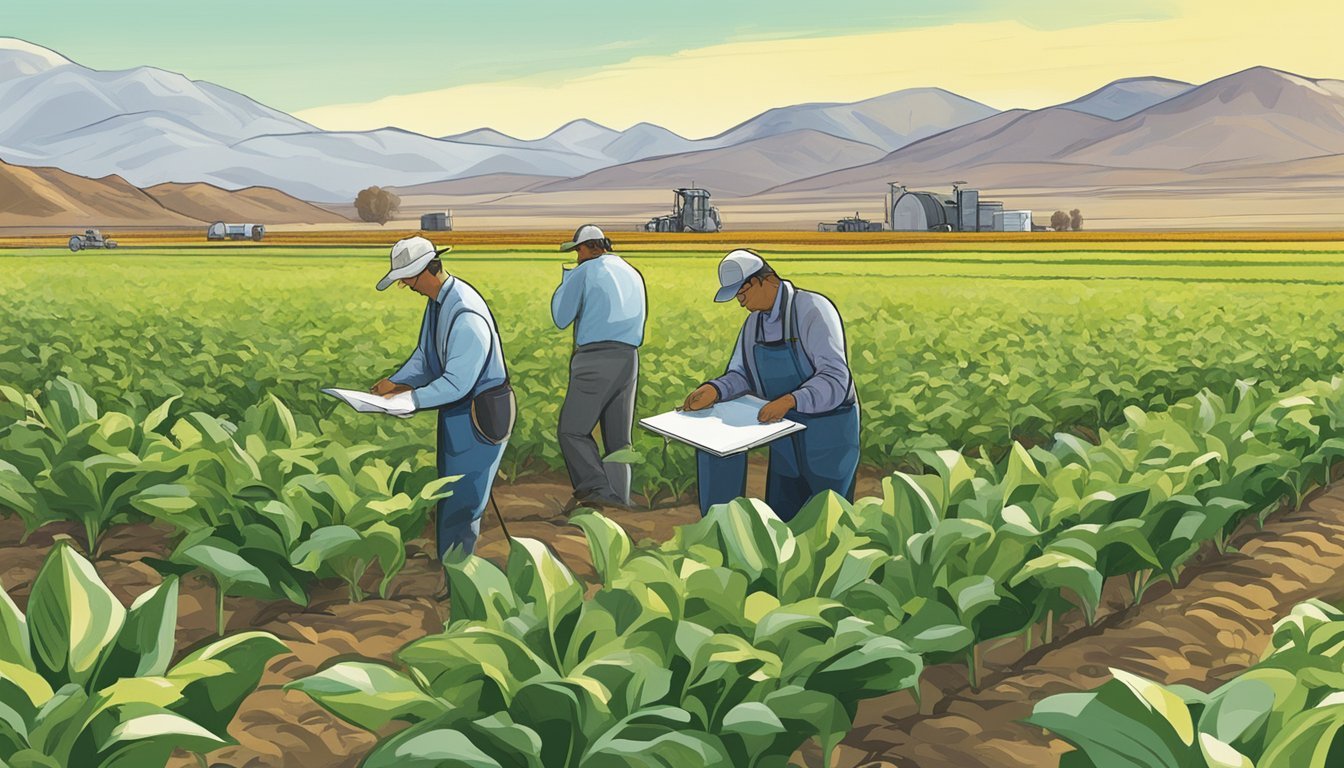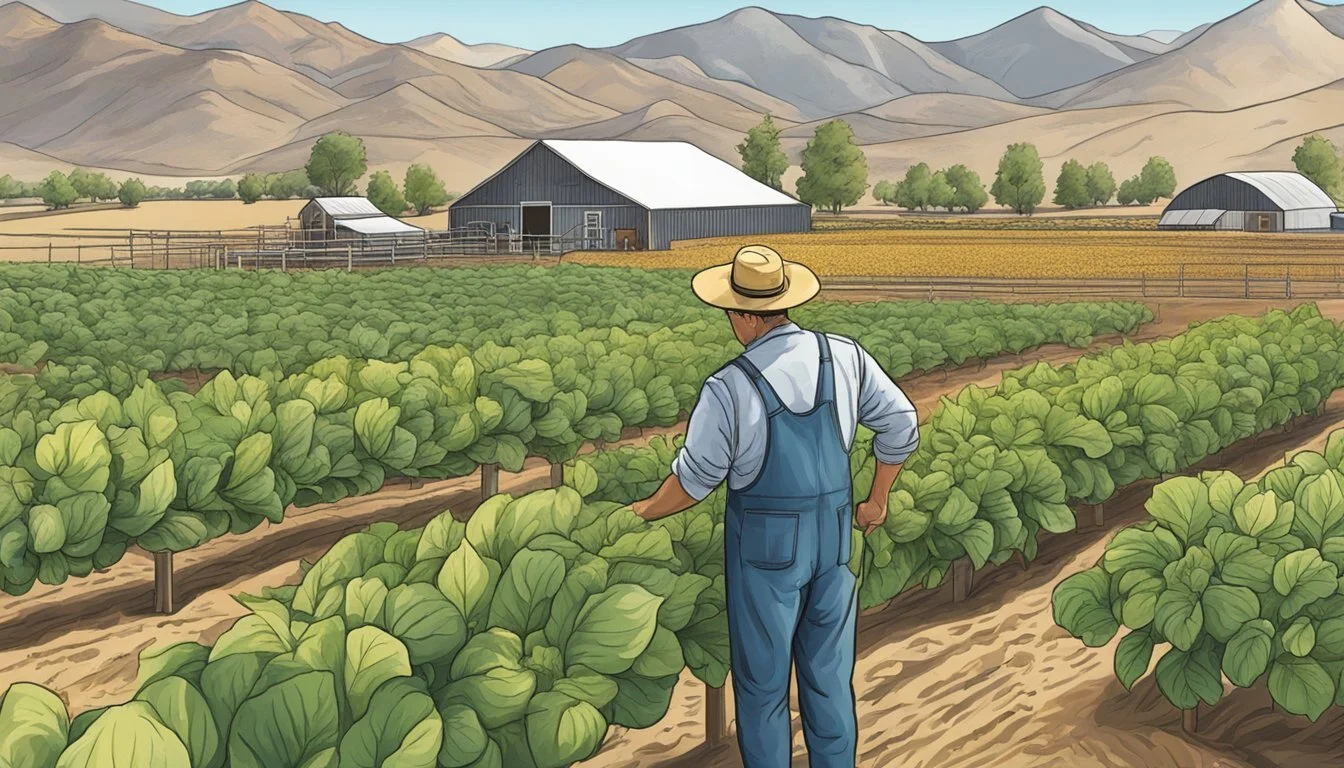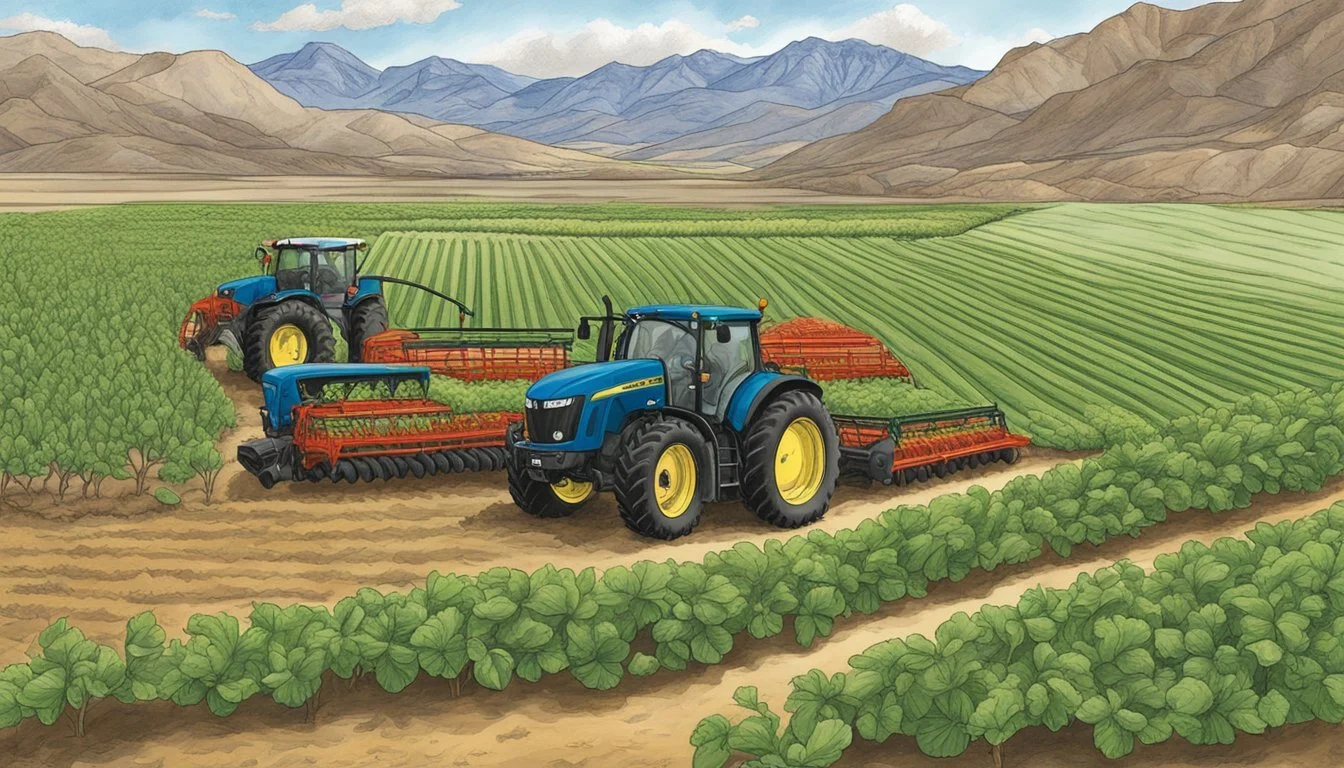Farming Grants Nevada
Navigating Opportunities for Agricultural Funding
Agriculture plays a significant role in Nevada's economy, with farming at its core. The state offers various grant opportunities aimed at supporting and strengthening the agricultural sector. These grants are essential for farmers, agricultural businesses, and researchers as they provide financial assistance that can be used for a range of activities, from crop production to research and education, to promoting sustainability and innovation within the industry. By tapping into these resources, recipients can advance their operations, adopt new technologies, and address unique challenges presented by Nevada's diverse climate and terrain.
The Nevada Department of Agriculture and other state agencies regularly post grant opportunities that can include legislatively mandated grants and federal subawards. Moreover, programs like the Specialty Crop Block Grant Program and the Cooperative Invasive Plant Cost Share offer funding specifically for certain agricultural activities. Understanding the nuances of these opportunities, from eligibility to application deadlines, is crucial for interested parties looking to capitalize on the financial support available.
In addition to state-administered programs, federal funding, such as the offerings from the USDA Farm Service Agency, plays a pivotal role in supporting Nevada's farmers. These programs not only assist with land purchases and conservation efforts but also aim at fostering rural business development. As deadlines can be strict and the competition fierce, staying informed and prepared with all necessary documentation is key to a successful grant application. The support structures in place through these grants enable the agricultural community in Nevada to thrive and continue to grow year after year.
Overview of Farming in Nevada
Nevada's farming sector is a significant contributor to its economy and the state is known for its diverse agricultural outputs. The arid climate and varying topography of Nevada present unique challenges as well as opportunities for local farmers. In this region, water is a precious resource, and much of the farmland depends on advanced irrigation systems to sustain crops.
Land Utilization
Approximately 86% of the state's land is federally owned, with a smaller proportion dedicated to farms and ranches. These farms often emphasize water-efficient practices to optimize their production.
Crops and Livestock
Fruit and Vegetables: Owing to its climate, Nevada specializes in growing certain types of fruits and vegetables that require less water.
Grains: The state also produces grains, though on a smaller scale due to water limitations.
Specialty Crops: These include crops like alfalfa for livestock feed, which is a significant crop in Nevada's agricultural output.
Soybeans and Other Commodities
While Nevada's environment is not conducive for growing soybeans on a large scale, it supports an array of specialty and alternative crops catered to niche markets and local consumption.
Sustainable Practices
Farmers in Nevada are increasingly employing sustainable farming practices to conserve natural resources. They are focusing on locally grown produce both for environmental benefits and to support the local economy, often marketed directly to consumers and restaurants.
Agricultural Support
Nevada provides multiple grant opportunities and resources for new and existing farmers to enhance their operations and develop resilient food systems infrastructure. These grants are designed to support the state’s agricultural activities and natural resource conservation, ensuring the growth and sustainability of Nevada’s farms.
Farming Grants in Nevada
Nevada offers a variety of grants aimed at enhancing the agricultural industry and supporting farmers in their endeavors. These grants are designed to promote competitive farming practices, sustainable agriculture, and provide financial support for farm-related projects.
Types of Agriculture Grants
Nevada farmers and agricultural businesses can access several types of grants, including:
Specialized Agricultural Finance Packages: These are designed to support farmers with the purchase of farm equipment and other capital investments.
Grants for Resilient Food Systems Infrastructure: These are aimed at enhancing the infrastructure required for resilient food systems within the state.
Specialty Crop Block Grant Program: Funded by the USDA, this program focuses on boosting the competitiveness of Nevada’s specialty crops through grants.
Rural Cooperative Development Grant Program: This program supports the development of rural cooperatives, which can be vital for the economic welfare of farming communities.
Eligibility for Grant Applications
Eligibility criteria for these grants typically include:
Farmers and Agricultural Businesses: Those actively engaged in agriculture-related operations within Nevada.
Compliance with Grant Specifications: Applicants must meet specific requirements set forth by each grant program, which may include project type, scope, and intended outcomes.
Grant Application Process
The application process generally entails the following steps:
Proposal Submission: Interested parties need to submit comprehensive proposals outlining their project and its potential impact.
Review Period: Submitted proposals undergo a review to ensure they align with the grant's priorities and eligibility criteria.
Notification: Successful applicants are notified and may be required to provide additional documentation or details.
Resources such as Grants.gov and the Farm Service Agency provide listings and application details for available grants.
Grant Funding Priorities
Grant funds are often allocated based on certain priorities, such as:
Innovation in Agriculture: Projects that introduce new technologies or practices.
Sustainability Efforts: Initiatives that lead to more sustainable farming methods.
Economic Impact: Programs that demonstrate potential for significant economic contribution to Nevada’s agricultural sector.
Education and Research: Projects focused on agriculture education or research receive special consideration for funding.
Agencies like the Nevada Department of Agriculture and the USDA facilitate these grant programs by providing financial assistance and technical aid to qualifying applicants.
Agricultural Research and Education
Agricultural research and education in Nevada encompasses the development and dissemination of best practices through comprehensive research while offering educational resources and support to farmers, educators, and youth interested in agriculture.
Role of Research in Agriculture
In Nevada, agricultural research embodies a crucial component for the advancement of farming practices and crop sustainability. Universities and research institutes collaborate to conduct pertinent research, with the goal of addressing local agricultural challenges. This research spans across various domains, including crop improvement, pest management, and water use efficiency. These initiatives not only contribute to the vitality of Nevada's agriculture but also aim to help farmers incorporate more sustainable practices into their operations.
Educational Resources for Farmers
Training and educational resources are pivotal for Nevada's farmers, as they ensure the practical application of cutting-edge agricultural research. The Nevada Agricultural Foundation promotes agricultural education by supporting quality research and offering funding for education assistance awards. Furthermore, Grants.gov and farm-specific funding agencies like the Farm Service Agency provide opportunities for financial support to engage in ongoing education and training, reinforcing the farmer's capacity to innovate and adapt.
Youth and Agriculture Education
In fostering future agricultural leaders, the state prioritizes education for the youth. Several programs are aimed at integrating the younger generation into the agricultural community. These include classroom-based programs and hands-on farming training designed to cultivate an interest in agriculture from a young age. Career guidance and scholarships available through foundations and educational grants support deserving individuals who aspire to pursue careers in agriculture, biotechnology, or related fields.
Universities and extension programs play a key role in this educational continuum, connecting the dots between academic knowledge and its application in real-world agriculture. Through such efforts, Nevada ensures that the next generation is well-equipped with the necessary skills and knowledge to sustain and progress the state's agricultural sector.
Natural Disaster and Farm Security
Nevada farmers face a unique set of challenges due to natural disasters such as wildfires, droughts, and floods. Ensuring farm security encompasses both preparedness for these events and effective response strategies to maintain agricultural viability.
Disaster Prevention and Relief
Disaster Preparedness: Nevada's agricultural sector is bolstered through initiatives aimed at mitigating the impact of natural disasters. Farmers are encouraged to participate in programs that equip them with the knowledge and tools to prevent extensive damage. The USDA offers assistance to improve infrastructure resilience against floods, fires, and erosion. Preventative measures can include creating firebreaks, improving irrigation systems to combat drought, and implementing soil conservation techniques to prevent erosion.
Emergency Response Plans: Regularly updated emergency plans are crucial for immediate response to disasters.
Infrastructure Investments: Strengthening farm structures and implementing smart land management to reduce vulnerability.
Disaster Relief Programs: When prevention measures are not enough, relief programs provide a safety net to affected farmers. The USDA and other entities offer aid through financial assistance and recovery services. These programs typically cover losses due to fires, floods, and prolonged drought conditions that can cause significant damage to crops and livestock.
Financial Aid: Assistance to cover crop losses and infrastructure repairs.
Technical Support: Guidance on restoring land and resources post-disaster.
Measures for Farm Security
Proactive Security Strategies: Security for farms not only involves safeguarding against theft or vandalism but also protecting against environmental pollution and resource depletion. Nevada agricultural agencies promote best practices for sustainable farming, ensuring long-term farm security.
Sustainable Practices: Encouraging crop rotation, organic farming, and reduced chemical usage to maintain soil health and reduce pollution.
Conservation Easements: Programs like ACEP support the protection of productive farm lands by preventing conversion to non-agricultural uses, thereby enhancing long-term security.
Relief Utilization: Post-disaster, successful recovery often depends on effective utilization of relief resources. Farmers can access various programs such as the resilient food systems infrastructure program or other cooperative invasive plant cost-share opportunities. These aim to restore agricultural operations by providing both financial resources and technical expertise.
Restoration Efforts: Funding and knowledge dissemination for farm and land restoration after a natural disaster.
Education and Training: Workshops and resources to help farmers adapt post-disaster and build back stronger.
Sustainable Agriculture and Environmental Health
In Nevada, efforts surrounding sustainable agriculture focus on enhancing farm profitability and environmental health. These initiatives not only strive to improve agricultural productivity but also to maintain the integrity of the ecosystem.
Sustainable Farming Practices
Sustainable farming practices in Nevada aim to reduce erosion, minimize pollution, and conserve water resources. Specific methods employed on farms include:
Crop Rotation: This helps maintain soil health and reduce pest outbreaks.
Cover Cropping: Farmers plant certain crops to protect and enrich the soil between periods of regular crop production.
Reduced Tillage: Limiting soil disturbance helps preserve soil structure and reduces erosion.
Integrated Pest Management (IPM): This approach minimizes the use of chemical pesticides, promoting natural pest control alternatives.
These practices not only support the longevity of the land but also ensure that it remains productive and healthy for future generations.
Environmental Regulations and Health
Regulations play a critical role in protecting environmental health as it relates to agriculture. They govern:
Chemical Use: Strict guidelines dictate the safe use and disposal of agricultural chemicals to prevent contamination of water and soil.
Water Management: Initiatives such as the Cooperative Invasive Plant Cost Share program aim to enhance water quality by controlling invasive species.
Conservation Programs: Programs like the Conservation Reserve Program (CRP) encourage farmers to convert farmland to habitat restoration, which offers benefits for both the environment and farm income.
These regulations help ensure that farming activities contribute positively to environmental health, and in doing so, they support the broader goal of sustainable agriculture in Nevada.
Economic and Infrastructure Development
In Nevada, economic prosperity and the upgrade of vital infrastructure in agriculture are closely tied to various grant opportunities and initiatives geared towards financing farms, enhancing infrastructure, and supporting tribal and rural agricultural efforts.
Financing for Farms
Nevada offers various financing solutions to support farming enterprises under the Consolidated Farm and Rural Development Act. These opportunities include grants and cooperative agreements aimed at bolstering the economic viability of farming operations. Grant opportunities often found on Grants.gov and through the Farm Service Agency, provide crucial funds for both new and established farmers to cover start-up costs, business development, and educational efforts that promote efficient and sustainable agricultural practices.
Infrastructure Improvements
The state invests in infrastructure improvements to advance the agriculture industry. The Resilient Food Systems Infrastructure Program is one such initiative set to open for applications. It focuses on developing robust food systems to withstand various challenges, thereby expanding access to nutritious food. This initiative includes building physical infrastructure such as irrigation systems and storage facilities, as well as implementing technology that increases the resilience and productivity of agricultural operations.
Tribal and Rural Agriculture Initiatives
Initiatives targeting rural areas and Indian tribe communities are pivotal in Nevada. These programs aim to enhance the economic outcomes of tribal and rural agricultural activities. They encompass a range of support, from the Cooperative Invasive Plant Cost Share RFP, designed to help manage invasive species, to assistance programs that facilitate access to necessary tools and resources for sustainable agricultural practices. The Nevada Rural Development State Office serves as a hub to bolster farming initiatives, ensuring that rural and tribal communities are not left behind in the push for agricultural development and economic growth.
Local and Specialty Crops
In Nevada, farming grants are dedicated to bolstering the market presence of locally grown specialty crops such as fruits, vegetables, tree nuts (how long do nuts last?), legumes, and horticulture products.
Promotion of Locally Grown Produce
Local farmers are given a platform to enhance the visibility of their produce. Funding efforts are channelled toward educational campaigns designed to inform consumers about the benefits of purchasing locally sourced fruits and vegetables. Such initiatives aim to strengthen consumer-farmer connections and encourage local economic growth.
Growing Specialty Crops
The state provides resources to support the cultivation of specialty crops, recognizing their high value and role in diversifying Nevada's agricultural output. Grants particularly aid in addressing the unique challenges faced by growers of non-commoditized crops, including research for sustainable farming practices and overcoming climatic limitations.
Market Development for Farm Products
A significant portion of the funding is allocated to developing new markets for Nevada's farm products. Efforts include:
Tailored marketing strategies.
Expansion of distribution channels.
Facilitating farmer-to-buyer networks.
Such market development pursuits are crucial in ensuring that agricultural products reach wider audiences, both domestically and internationally, thereby driving the success of the state's farming communities.
Federal and State Agencies
In Nevada, farmers can access a variety of grants and support through both federal and state agencies designed to promote sustainable agriculture and economic development.
The Role of USDA
The United States Department of Agriculture (USDA) offers comprehensive support to the farming community. One of its key involvements in Nevada includes offering competitive grant opportunities intended to bolster food systems infrastructure and address invasive plant issues.
Key USDA Programs in Nevada:
Resilient Food Systems Infrastructure Program
Cooperative Invasive Plant Cost Share Program
Assistance from Farm Service Agency
The Farm Service Agency (FSA), operating under the USDA, provides targeted aid to address environmental concerns. In Nevada, initiatives such as the Conservation Reserve Enhancement Program (CREP) work in specific watersheds to combat environmental challenges linked to farming.
FSA Loans and Programs:
Direct Farm Ownership Loan: Supports farmers in acquiring agricultural property.
Priority Areas: Including initiatives in Lake Macatawa, River Raisin, and Saginaw Bay Watersheds.
State Government Resources
Nevada’s state government agencies offer further funding opportunities which include legislated grants and federal sub-awards. Farmers are encouraged to apply directly to these agencies for opportunities that may not be available at the federal level.
Grant Application Portals:
Legislatively Mandated Grants
Federal Subaward Opportunities
State agencies aim to ensure that economic and community development aligns with the needs of rural areas, providing support to various business and agricultural ventures through programs like the Rural Business Development Grant.








